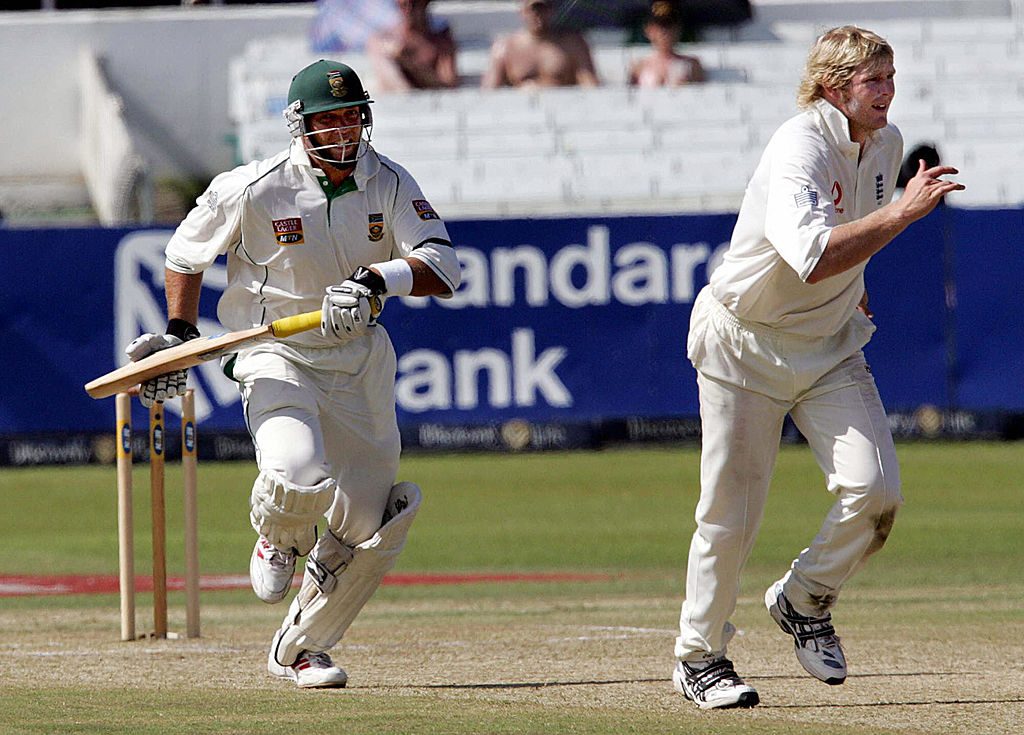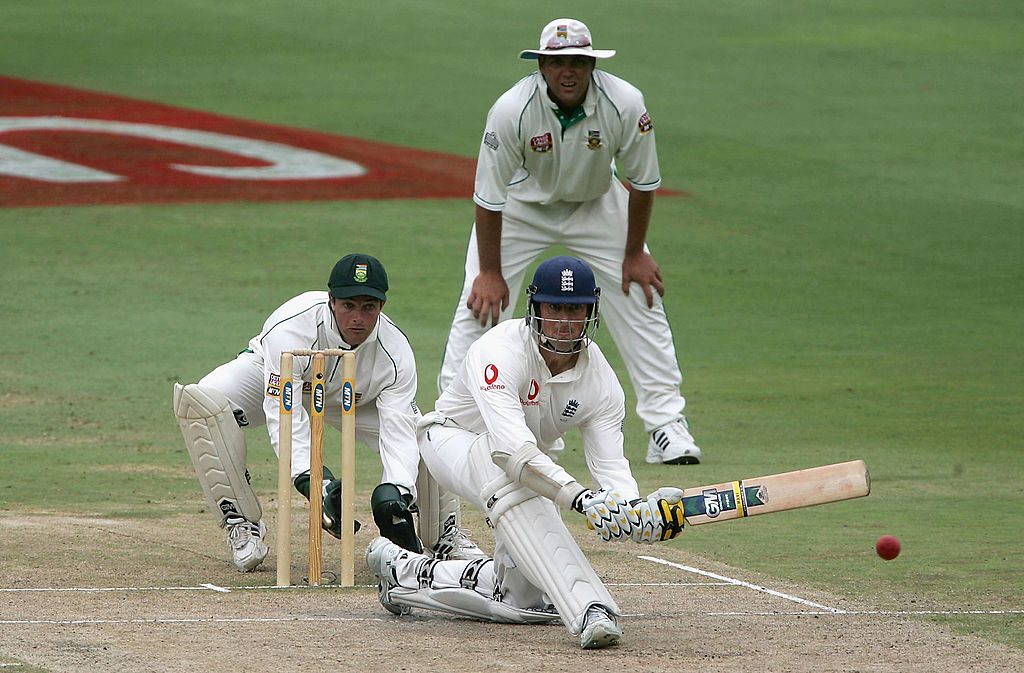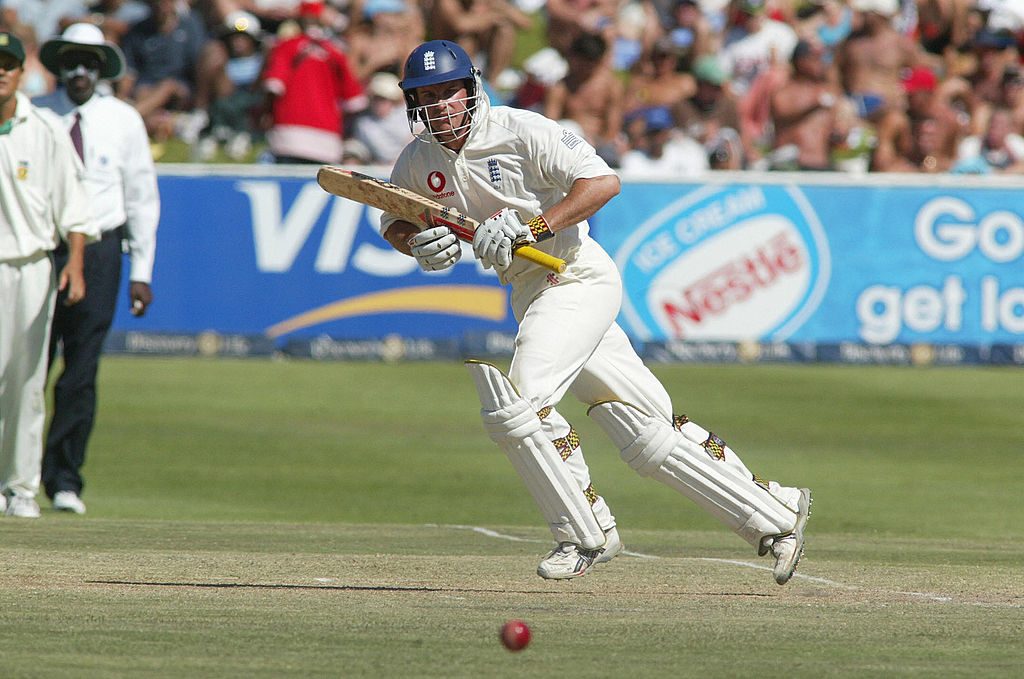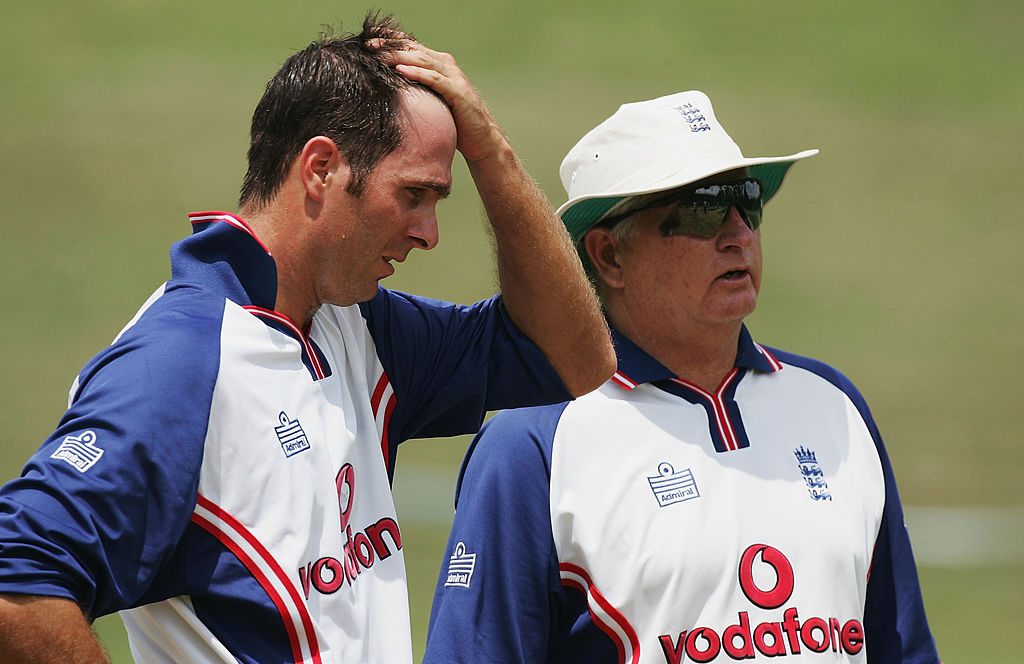
In issue 27 of Wisden Cricket Monthly, Rob Smyth looked back on England’s triumphant tour of South Africa in 2004/05, a series won on the back of the ‘Vaughan principle’ and a victory which set the tone for the extraordinary summer that followed.
This article first appeared in issue 27 of Wisden Cricket Monthly.
The 2005 Ashes series casts a long shadow. England’s win over Australia was so seismic, so euphoric that it squashed the memory of everything that preceded it. Even before Michael Vaughan’s side won the greatest series most of us will ever see, they achieved things that would have defined many England teams: a first win in the Caribbean for 36 years, a clean sweep of seven Tests in the summer of 2004 and, most impressive of all, a first win in South Africa in 40 years.
In an endlessly melodramatic series, England became the first team apart from Australia to win in South Africa since their return from isolation. If it was an underrated triumph, it was built on an underappreciated side of Vaughan’s team. Their attacking brilliance, and the infectious fun they seemed to have everywhere from Edgbaston to 10 Downing Street, obscured an equally important quality: the kind of resilience, individual and collective, that is usually associated with grizzled, gnarled veterans. They were certainly not a team of good-time Charlies.
 Jacques Kallis scored three hundreds in the series
Jacques Kallis scored three hundreds in the series
“We did not receive the credit we deserved for that win in South Africa,” said England’s coach Duncan Fletcher. “Quite often [the team] have dug a hole for themselves, but more often than not they have been capable of climbing out of it. That takes character.” This, after all, was the team that prompted Ashley Giles to make an earthy contribution to the cricket lexicon. “Whether we win or lose,” he said, “we relish creating a bit of an arse-nipper.”
The South Africa series was particularly severe on the derriere. There were a few reasons for that, including an unprecedented schedule of five Tests in 40 days. The series was full of huge partnerships and sudden collapses. “That was why the tour proved so mentally draining,” said Vaughan. “Every single session ebbed and flowed and nobody could tell which way it was going to go.”
The main reason was that England were nowhere near their coruscating best. Most of the team were flailing for form; plenty were struggling physically; others were experiencing the scarily debilitating effects of mental-health problems for the first time.
The win was a triumph of a modern kind of mental strength. That and what Marcus Trescothick called “the Vaughan principle: of expression and positivity, of backing your ability and of looking to win at all times, no matter how lousy the view”. Vaughan had long since decided that it was the only way to beat Australia.
The biggest test of his nerve, and the pivotal moment of the series, came in the fourth Test at Johannesburg. The series was 1-1, the first-innings scores were all but level, with South Africa leading by eight. When Vaughan joined Trescothick, England were 51-2 in their second innings; with their remaining batsmen struggling for form, they were one wicket away from serious trouble.
Vaughan walked his own talk, hitting three boundaries in his first eight balls to launch a resounding counterattack. “I can honestly say I did not care less whether we lost or drew this match and therefore the series,” said Vaughan. “I just wanted to have every chance of winning it.”
 Marcus Trescothick faced struggles coming into the series but finished with 448 runs including two centuries
Marcus Trescothick faced struggles coming into the series but finished with 448 runs including two centuries
After a blistering partnership of 124, wickets began to fall at the other end. Trescothick didn’t care. “I attacked and attacked and, with each falling wicket, attacked again.” He blasted an extraordinary 180 to enable England’s second declaration of the match. It was unusually cautious for Vaughan – 325 in 68 overs – but he knew that four of his five-man attack were struggling either physically or mentally. The only bowler in full health was Matthew Hoggard, the man whose role was usually to sweep the shop floor.
On that magical day in Johannesburg, Hoggard was the team leader, the president and the CEO. “As soon as I started bowling, I felt able to put the ball exactly where I wanted it, at a good pace and with a decent amount of swing,” he said. “I can’t explain how or why that happened, it was just one of those things.”
Hoggard took 7-61 – and 12-205 in the match – to give England the most joyously unexpected of victories. It included a devastating outswinger to dismiss Jacques Kallis, who had been the bane of England all series, for a golden duck. “As far as I was concerned,” said Hoggard, “it was not far from being a perfect dismissal.”
England drew a rain-affected final Test to seal a series victory, before enjoying the particular pride that comes with achieving something significant when you are nowhere near your best overall. Despite that, they had stayed true to the Vaughan principle and produced spells of exhilarating brilliance. They gave the old concept of winning ugly a sexy makeover.
***
There were a handful of players who excelled throughout. Hoggard took 26 wickets and Flintoff 23, though he struggled with the bat as a result of trying to make himself too technically perfect. The star of the series was Andrew Strauss, who slammed 656 runs in five Tests. He played with an attacking verve that is sometimes forgotten, hitting three centuries, though he regarded a swaggering, match-winning 94 not out in the first Test as his best innings.
The only thing that unnerved Strauss was the amount of praise he received. He became the fastest Englishman to reach 1,000 Test runs since the Second World War, and at one stage during the series he had the second-highest average in Test history. “In an effort to keep in touch with reality I even considered stopping reading the papers,” he said. “Me, Andrew Strauss, in the same sentence as Don Bradman – what a joke.”
 Andrew Strauss was the top run-scorer in the series with 656 runs at an average of 73
Andrew Strauss was the top run-scorer in the series with 656 runs at an average of 73
Though all the batsmen played at least one important innings, Strauss and Trescothick were the only England players to pass 300 runs. They provided another demonstration of England’s escapology in the second Test. With England trailing by 193 on first innings, they added 273 for the first wicket. When bad light stopped play on the final evening, South Africa were eight down and hanging on. Vaughan felt the turnaround in that game ultimately decided the series.
At the start of the tour, Trescothick could not have imagined such carefree batting. He suffered extreme anxiety at the thought of going on tour after his pregnant wife Hayley fainted at the cinema and needed an ECG. It was all clear, but Trescothick could not sleep or eat when he arrived. He would later recognise this period as the first sign of the problem that ended his international career. He improved steadily with the help of sleeping pills – “In the next year or so I found Zopiclone; it’s better than Horlicks” – and the team psychologist Steve Bull. When his wife came out for the second Test he woke up one morning feeling fine.
His form recovered simultaneously. After the first innings of that second Test, Trescothick told Fletcher that he felt unbalanced at the crease and that his bat wasn’t coming down straight. Fletcher took him to the nets, watched without comment for five minutes and then stopped the session. He told Trescothick to relax his right arm and open his shoulder slightly so that he was more front-on.
Trescothick felt better straight away – “I found that I was absolutely smoking it” – and he regards his 180 in the fourth Test as the greatest innings of his life. It’s often said that batsmen in the zone see the ball early; Trescothick found that he saw it slowly, likening it to a scene from The Matrix. “I experienced that super slow-motion effect almost from the first ball I faced and now, with my new improved technique, I just felt the ball had not yet been invented that could actually get me out.”
It was a reminder – not that anyone in the dressing room needed it – of Fletcher’s peerless genius for understanding and developing batting techniques. But overall, at least until the series was over, it was an unhappy tour for Fletcher. He was desperate to prove himself – and validate the decision to become England coach – in the country where he made his name, and became withdrawn as a result. “If I had my time again,” he said, “I would treat this tour differently.”
Fletcher’s distant behaviour contributed to a strange mood at the start of the tour. Vaughan could not work out why a team that had got on so brilliantly the previous summer seemed to be on edge. He concluded that the main reason was the draining, politically charged one-day series in Zimbabwe that preceded the South Africa tour. Some of the Test squad either missed or pulled out of that trip, which created a vague ‘us-and-them’ mood.
Vaughan felt the old team spirit started to return during practice before the fourth Test. It was certainly evident after, as the team celebrated spectacularly. The team ethic was summed up by Graham Thorpe, who giddily announced it was the greatest win of his long England career. He scored 0 and 1 in the game.
 England won six consecutive series under Michael Vaughan and Duncan Fletcher across 2004 and 2005
England won six consecutive series under Michael Vaughan and Duncan Fletcher across 2004 and 2005
Thorpe also symbolised England’s fighting spirit. He was struggling throughout the series with his back – “I knew I was on borrowed time” – and technique, yet willed his way to two vital, ultimately match-saving innings in the second and fifth Tests. “I’m not sure how I managed it but I guess it just proved, again, the value of experience… I chiselled out runs in a way I would have died for when I was 25 years old and kept on failing to turn fifties into hundreds.”
Most of the England team went to some dark places during or before the tour. Steve Harmison, who started the series as the world’s No.1 bowler, took nine wickets at an average of 73. He was diagnosed with clinical depression earlier in the year and was so anxious at the prospect of touring that he considered crashing his car on the way to the airport so that he could spend a bit more time at home. “Imagine the thing you dread most in your life and then think what you would do to stop it,” he said. “That’s how it was with me. A nice little shunt on a roundabout, a bruised leg, whiplash, and that would have been me for a few days.”
His best mate Flintoff did end up in hospital. He bowled himself into the ground and, at the end of the series, needed the first of four ankle operations. Many of England’s individual problems were unknown at the time – inside the dressing room, never mind outside. The external focus was on South Africa. They used 18 players to England’s 13. And though their side might look awesome on paper – Smith, Gibbs, de Villiers, Amla, Kallis, Boucher, Pollock, Ntini and Steyn all played in the series – only Kallis, Ntini and Pollock were really at their peak. Even so, there is no such thing as a bad series victory in South Africa.
The win did not really cement England’s XI for the Ashes; Ian Bell and Kevin Pietersen would replace Rob Key and Thorpe before the start of that series. But it increased their reserves of self-belief and made the most powerful statement yet that they were not like all the other England sides; that, under extreme pressure, they were capable of not just excellent but also devastating brilliance. “I always thought,” said Vaughan, “that to be seen as genuine contenders to beat Australia we needed a win that winter.”
Every bit of success was more positive reinforcement for the Vaughan principle. Had the team compromised in South Africa, there is no way they would have been able to rebound from a thrashing at Lord’s in the first Ashes Test by scoring 407 in less than 80 overs in the next match at Edgbaston. The 2005 Ashes may have obscured what went before, but it would not have been possible without it.








